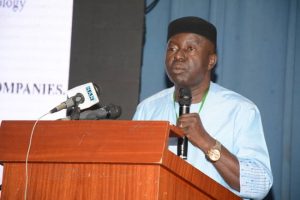A retired director and former head of the Department of Environmental Sciences and Technology at the Federal Ministry of Science and Technology, Dr. Peter Ekweozoh, has said that the quest for green transition and sustainability in Nigeria and indeed globally cannot be achieved unless there is a deep change in values and attitudes across all segments of society.

Dr. Ekweozoh made this statement when he spoke at a gathering of experts, professionals, public and private sector representatives, technocrats, and key stakeholders within and outside the oil and gas sector in a webinar hosted by the Centre for Climate Change and Development of the Alex Ekwueme Federal University Ndufu-Alike, Ebonyi State (CCCD-AEFUNAI) in partnership with the World Resources Institute (WRI) in Washington, USA, to launch a report on the oil and gas transition in Nigeria. It held on Thursday, March 21, 2024.
Dr. Ekweozoh commended the efforts of the CCCD-AEFUNAI team led by Professor Chukumerije Okereke, a globally renowned scholar in climate policy and governance, in carrying out the research on just energy transition for Nigeria. The said the study was long overdue, given Nigeria’s huge reliance on oil and gas and the need to plan for a future that guarantees the prosperity of the country in a global low-carbon future, he said.
Dr. Ekweozoh identified attitudinal change, discipline, cutting down on waste, and adding value at all levels in the country as foundational principles for effectively dealing with the challenges of energy transitions. He commended the recent show of interest by the government, targeted at reducing resource wastage in the public sector, but said Nigeria must have a policy of value addition at all levels of business engagement and commercialization of resources as the best way of driving diversification.
He emphasised that value addition, which creates diversification, must be rigorously pursued in all facets of our production affairs. Here, he emphasised the need for Nigeria to scale up capital projects in quality and quantity instead of continuing to spend on non-progressive recurrent expenditures. He also identified the need for value addition not just to material resources but to human resources by reviewing the curriculum in our education sector and reskilling it in tandem with recent technological and national development drives and policies.
He said Nigeria is caught in the web of endless projects and recycling with very limited innovations and implementation, saying there are numerous policy documents without coordination and implementation at the federal and state levels.
Dr. Ekweozoh prescribed a national strategy on global competitiveness for Nigeria in the quest for a just energy transition. The strategy should involve the deployment and use of human (e.g., youth) and material (e.g., gas) resources that are in abundance in the country, illustrating the strategy of policymaking based on adding value to existing resources as more cost-effective. He lamented that the National Policy on Methanol Fuel Production Technology, which seeks to add value to natural gas resources, large waste dumps, coal, and agriculture with the scope to create 10 million jobs, has not been implemented despite his concerted effort to promote this policy to successive governments.
Dr. Ekweozor also recalled his effort at leading Nigeria’s Technology Needs Assessment under the United Nations Framework Convention on Climate Change (UNFCCC), noting that massive investment in technology and innovation is required to complement value change to build multiple components of our products, ensuring product diversification, creating multiple jobs, driving massive economic development, and financing the technology needed to transition to a cleaner and greener economy.
By Mark Amadi, Research Fellow, CCCD-AEFUNAI
